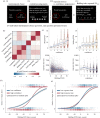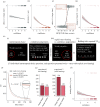Intertemporal choice reflects value comparison rather than self-control: insights from confidence judgements
- PMID: 36314145
- PMCID: PMC9619231
- DOI: 10.1098/rstb.2021.0338
Intertemporal choice reflects value comparison rather than self-control: insights from confidence judgements
Abstract
Intertemporal decision-making has long been assumed to measure self-control, with prominent theories treating choices of smaller, sooner rewards as failed attempts to override immediate temptation. If this view is correct, people should be more confident in their intertemporal decisions when they 'successfully' delay gratification than when they do not. In two pre-registered experiments with built-in replication, adult participants (n = 117) made monetary intertemporal choices and rated their confidence in having made the right decisions. Contrary to assumptions of the self-control account, confidence was not higher when participants chose delayed rewards. Rather, participants were more confident in their decisions when possible rewards were further apart in time-discounted subjective value, closer to the present, and larger in magnitude. Demonstrating metacognitive insight, participants were more confident in decisions that better aligned with their separate valuation of possible rewards. Decisions made with less confidence were more prone to changes-of-mind and more susceptible to a patience-enhancing manipulation. Together, our results establish that confidence in intertemporal choice tracks uncertainty in estimating and comparing the value of possible rewards-just as it does in decisions unrelated to self-control. Our findings challenge self-control views and instead cast intertemporal choice as a form of value-based decision-making about future possibilities. This article is part of the theme issue 'Thinking about possibilities: mechanisms, ontogeny, functions and phylogeny'.
Keywords: confidence; decision-making; intertemporal choice; metacognition; self-control; value-based choice.
Figures


Similar articles
-
Is it patience or motivation? On motivational confounds in intertemporal choice tasks.J Exp Anal Behav. 2015 Jan;103(1):196-217. doi: 10.1002/jeab.118. Epub 2014 Dec 25. J Exp Anal Behav. 2015. PMID: 25545635
-
The Attraction Effect Modulates Reward Prediction Errors and Intertemporal Choices.J Neurosci. 2017 Jan 11;37(2):371-382. doi: 10.1523/JNEUROSCI.2532-16.2016. J Neurosci. 2017. PMID: 28077716 Free PMC article.
-
The role of ventromedial prefrontal cortex in reward valuation and future thinking during intertemporal choice.Elife. 2021 Aug 3;10:e67387. doi: 10.7554/eLife.67387. Elife. 2021. PMID: 34342577 Free PMC article.
-
The neurobiology of intertemporal choice: insight from imaging and lesion studies.Rev Neurosci. 2011;22(5):565-74. doi: 10.1515/RNS.2011.046. Rev Neurosci. 2011. PMID: 21967518 Review.
-
Social choice for one: On the rationality of intertemporal decisions.Behav Processes. 2016 Jun;127:97-108. doi: 10.1016/j.beproc.2016.04.011. Epub 2016 Apr 23. Behav Processes. 2016. PMID: 27118422 Review.
Cited by
-
Imagining emotional events benefits future-oriented decisions.Q J Exp Psychol (Hove). 2022 Dec;75(12):2332-2348. doi: 10.1177/17470218221086637. Epub 2022 Apr 12. Q J Exp Psychol (Hove). 2022. PMID: 35225089 Free PMC article. Clinical Trial.
-
Dynamic Functional Connectivity Between Amygdala and Cognitive Control Network Predicts Delay Discounting in Older Adolescents.Hum Brain Mapp. 2025 Jul;46(10):e70270. doi: 10.1002/hbm.70270. Hum Brain Mapp. 2025. PMID: 40586125 Free PMC article.
-
Neural basis of self-control.bioRxiv [Preprint]. 2025 Aug 2:2024.02.07.578652. doi: 10.1101/2024.02.07.578652. bioRxiv. 2025. PMID: 40766437 Free PMC article. Preprint.
-
Frontopolar Cortex Interacts With Dorsolateral Prefrontal Cortex to Causally Guide Metacognition.Hum Brain Mapp. 2025 Feb 1;46(2):e70146. doi: 10.1002/hbm.70146. Hum Brain Mapp. 2025. PMID: 39878207 Free PMC article.
-
Thinking about possibilities: mechanisms, ontogeny, functions and phylogeny.Philos Trans R Soc Lond B Biol Sci. 2022 Dec 19;377(1866):20210333. doi: 10.1098/rstb.2021.0333. Epub 2022 Oct 31. Philos Trans R Soc Lond B Biol Sci. 2022. PMID: 36314156 Free PMC article.
References
-
- Logue AW. 1988. Research on self-control: an integrating framework. Behav. Brain Sci. 11, 665-709. (10.1017/S0140525X00053978) - DOI
Publication types
MeSH terms
Grants and funding
LinkOut - more resources
Full Text Sources
Miscellaneous

